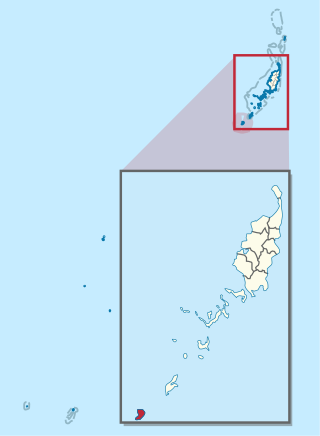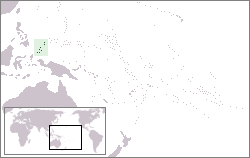Palau is an island nation in the Pacific Ocean.
Contents
Palau may also refer to:
Palau is an island nation in the Pacific Ocean.
Palau may also refer to:

Palau is an island country in the Micronesia subregion of Oceania in the western Pacific. The republic consists of approximately 340 islands and connects the western chain of the Caroline Islands with parts of the Federated States of Micronesia. It has a total area of 466 square kilometers (180 sq mi), making it one of the smallest countries in the world. The most populous island is Koror, home to the country's most populous city of the same name. The capital Ngerulmud is located on the nearby island of Babeldaob, in Melekeok State. Palau shares maritime boundaries with international waters to the north, the Federated States of Micronesia to the east, Indonesia to the south, and the Philippines to the northwest.

Palau was initially settled around 1000 BC.

"Belau rekid" is the national anthem of Palau. Officially adopted in 1981, the music was composed by Ymesei O. Ezekiel, to which the combined words of several authors were set.

The flag of Palau was adopted on 1 January 1981, when the island group separated from the United Nations Trust Territory. As with the flags of several other Pacific island groups, light blue is the color used to represent the ocean and the nation's place within it. While this puts Palau in common with the Federated States of Micronesia and other neighboring island groups, the disc on the flag is off-centre like that of the flag of Bangladesh, but in this case the disc represents the moon instead of the sun. The current flag was introduced in 1981 when Palau became a republic.
Palauan is a Malayo-Polynesian language native to the Republic of Palau, where it is one of the two official languages, alongside English. It is widely used in day-to-day life in the country. Palauan is not closely related to other Malayo-Polynesian languages and its exact classification within the branch is unclear.

Peleliu is an island in the island nation of Palau. Peleliu, along with two small islands to its northeast, forms one of the sixteen states of Palau. The island is notable as the location of the Battle of Peleliu in World War II.

Angaur, or Ngeaur in Palauan, is an island and state in the island nation of Palau.
The Micronesians or Micronesian peoples are various closely related ethnic groups native to Micronesia, a region of Oceania in the Pacific Ocean. They are a part of the Austronesian ethnolinguistic group, which has an Urheimat in Taiwan.
Palauan may refer to:
Tobi may refer to:

The following is an alphabetical list of topics related to the Republic of Palau.
There is a small Japanese community in the Pacific Island country of Palau, which mainly consists of Japanese expatriates residing in Palau over a long-term basis. A few Japanese expatriates started to reside in Palau after it gained independence in 1994, and established long-term businesses in the country. Japanese settlement in Palau dates back to the early 19th century, although large scale Japanese migration to Palau did not occur until the 1920s, when Palau came under Japanese rule and administered as part of the South Seas Mandate. Japanese settlers took on leading administrative roles in the Japanese colonial government, and developed Palau's economy. After the Japanese surrender in 1945, virtually all of the Japanese population was repatriated back to Japan, although people of mixed Japanese-Palauan descent were allowed to remain behind. People of Japanese-Palauan descent constitute a large minority of Palau's population as a result of substantial intermarriage between the Japanese settlers and Palauans. They generally identify with, conforming to cultural norms and daily lives with the Palauans.
Chinese have been settling in Palau in small numbers since the 19th century. The early settlers consisted of traders and labourers, and often intermarried with Palauan women. Their offspring quickly assimilated with the local populace and generally identify themselves as Palauan. In recent years, Palau has seen a growing expatriate business community from Taiwan, after Palau established formal diplomatic ties with Taiwan in 1999.

Sonsorol is one of the sixteen states of Palau. The inhabitants speak Sonsorolese, a local Chuukic language, and Palauan.
The sport of baseball is widely played in Palau, having been introduced by the Japanese during their occupation of the island nation. The highest level of league play in Palau in represented by Palau Major League (PML), which is overseen by the Belau Baseball Federation. The country is represented in international play by the Palau national baseball team.

Diplomatic relations are maintained between Japan and Palau, a small island country in the western Pacific Ocean that was once a Japanese colony. There is a Japanese embassy on the Palauan island of Koror and a Palauan embassy in Tokyo.
Women in Palau, known also as Palauan women, Belauan women, Pelew women, or Women of Los Palaos Islands are women who live in or are from Palau. Historically, there was a strong "gendered division of labor" between women and men of Palau.
Palau language may refer to:
Palao may refer to:
Palauan nationality law is regulated by the 1980 Constitution of Palau, as amended; the 1994 Palau Citizenship Act, and its revisions; and international agreements entered into by the Palauan government. These laws determine who is, or is eligible to be, a national of Palau. The legal means to acquire nationality, formal legal membership in a nation, differ from the domestic relationship of rights and obligations between a national and the nation, known as citizenship. Palauan nationality is typically obtained either on the principle of jus soli, i.e. by birth in Palau or under the rules of jus sanguinis, i.e. by birth abroad to parents with Palauan nationality. It can be granted to persons with an affiliation to the country through naturalization.